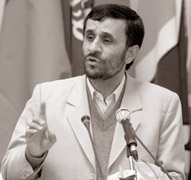|
observer |
|
|
|
|
|
OTHER LINKS |

|

|

|
Ahmadinejad Talking toughThe so-called opening to Iran and Syria is going to be a difficult enterprise. A close reading of the British Prime Minister Tony Blair's speech on Monday evening shows that the conditions for engagement would amount to a wholesale change of direction by Iran and its President Ahmadinejad in particular.
And at about the same time at the White House, following a meeting with the Israeli Prime Minister Ehud Olmert, President Bush himself indicated that Syria and Iran would have to change first. In particular, he set the condition that Iran would have to suspend its enrichment of uranium. Mr. Blair's speech (a re-run basically of one he made in Los Angeles on 1 August) described the strategy in this way: "Offer Iran a clear strategic choice: they help the MEPP [Middle East Peace Process] not hinder it; they stop supporting terrorism in Lebanon or Iraq; and they abide by, not flout, their international obligations. In that case, a new partnership is possible. Or alternatively they face the consequences of not doing so: isolation." In Los Angeles, he had said: "We need to make clear to Syria and Iran that there is a choice: come in to the international community and play by the same rules as the rest of us; or be confronted." Bush's comments As for President Bush, he was even more forthright. On Syria: "We expect the Syrians to be, one, out of Lebanon so that the Lebanese democracy can exist; two, not harbouring extremists that create - that empower these radicals to stop the advance of democracies; three, to help this young democracy in Iraq succeed. And the Syrian president knows my position." On Iran: "If the Iranians want to have a dialogue with us, we have shown them a way forward, and that is for them to verify - verifiably suspend their enrichment activities." There doesn't appear to be much diplomatic room there for engagement over Iraq or anything else. The message is: you have to change, not us. It is an offer Iran and Syria might refuse. Iraq Study GroupSo why is the prospect of bringing Iran and Syria into discussion about Iraq and the Middle East even being raised? For two reasons. The first is that Iraq has gone badly and President Bush lost the mid-term elections. He is having to search around for any new idea. The concept of bringing in the neighbours for a friendly talk about Iraq appeals to many. He is facing the collapse of his grand project for democracy in the "Greater Middle East". The second is that the Iraq Study Group, the high-level panel led by James Baker, the former secretary of state for President Bush senior, and Lee Hamilton, a former Democratic congressman, is to report soon. Word from that group is that it might recommend that Iran and Syria be indeed consulted, perhaps as part of a regional conference on Iraq. Therefore, both the US and UK have to take positions on the possibility of engagement with Iran and Syria. Mr Bush saw the group on Monday. Mr Blair speaks to them by video link on Tuesday. Stringent conditions The comments by both Mr Bush and Mr Blair could be seen as an attempt to head off that engagement, unless it is on totally different terms. The conditions set are so high. And Mr Blair, in his concentration during his final months on what he calls a "whole" Middle East approach, is way out ahead of his White House ally, who does not think that the time is right for any push on the Israel/Palestine front. In fact, the main concern in Washington is not to "start with Israel/Palestine", as Mr Blair put it. Nor does the administration think that Iran and Syria would be of much use at present. The main Bush concern is over a demand by senior Democrats that the US commit itself to a phased withdrawal of US troops starting in four to six months. This is also something the Iraq Study Group might address. And Mr Bush is still hinting that his room for manoeuvre is small. "I believe it is very important, though, for people making suggestions to recognise that the best military options depend upon the conditions on the ground," he said. There is also deep scepticism in the Bush administration that either Iran or Syria would do much to ease the plight of US and UK troops in Iraq. Middle East watchers are also doubtful that this will lead very far. Rosemary Hollis of Chatham House in London said: "It is totally logical to think that you cannot solve Iraq without involving its neighbours. But my fear is that this will fall down in the execution. The US and UK have no idea that the shoe is on the other foot. It is they who are weak. Yet they still expect Iran to make all the concessions." The Iraq Study Group is expected to report in December. |









